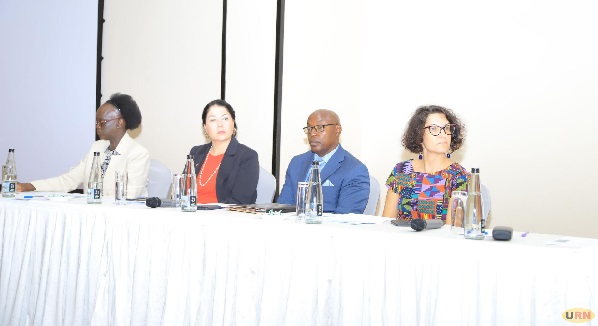
Kampala, Uganda | THE INDEPENDENT | The conviction rates from Sexual and Gender-Based Violence cases have reduced by ten percent. This was revealed at the (SGBV) Post Phase 6 Session Review meeting held in Kampala on Monday.
The meeting brings together different actors in the criminal justice system including the Uganda Police Force, the Office of the Director of Public Prosecutions, the Judiciary, Uganda Prisons Services, Ministry of Gender, Labor, and Social Development.
Others are the United Nations Population Fund-UNFPA, the Australian Development Cooperation Agency, the Spotlight Initiative, and Sweden Sverige.
The Governance and Security Programme Senior Technical Advisor, Rachel Odoi Musoke said the session is an opportunity to reflect on what lessons to learn and to improve the performance to achieve case backlog reduction and improve the quality of justice being delivered in the country.
She however revealed that there was a reduction of conviction rates from 74 percent to 64 percent. Musoke was concerned about the conviction rate since it was once at 80 percent.
Odoi explained that they would investigate the reasons behind the reduction in the conviction rate, but emphasized the need for continued coordination among the Justice actors.
According to Odoi, the review meeting is aimed at forging ways to reduce SGBV crimes and pressure on the justice system. She said in the previous session, 12 districts were covered and an 80 percent case disposal rate was recorded and documented.
She said they should be able to conclude cases within the required time such that sessions once they begin, move on smoothly.
The Principal Judge Dr. Flavian Zeija urged Judicial Officers to take charge of their courts and solve the challenges associated with the reduction of conviction rates in cases of SGBV.
Dr. Zeija said the reductions depend on the Judges presiding over the case. He cited 2018 when they had a successful session in Bushenyi where 99 percent of witnesses turned up.
Narrating how he was able to achieve the target, Dr. Zeija said that he worked closely with the Police and any witness that refused to turn up in court would be arrested for contempt of court, compelled to testify, and then cautioned.
According to the Principal Judge, the witnesses who didn’t turn up would be exempted due to lack of transport to court. He also noted that SGBV sessions continue to be affected by the lack of shelters for SGBV victims.
Zeija, highlighted weak data management systems, lack of video learning and virtual materials to conduct SCBV sessions, and limited resources as one of the challenges affecting the sessions. He believes that the Certificate of Financial Implications is also a challenge as they are not haa witness protection law.
He was hopeful that the meeting would address some of the challenges and how to optimally design the project and its implementation for the seventh phase.
“It is important to evaluate the past session. If you can’t measure, you can’t manage. Evaluation is very critical in the management of programs”, said Zeija.
He said the evaluation will help in identifying areas of improvement hence effectiveness and efficiency. Zeija called for impact management with a meaningful outcome with figures and statistics that tell stories.
The Programme Coordinator of UNFPA Laura Criado, said that they are funding 135 countries in the fight against SGBV but Uganda is a role model in the region.
She indicated that they need to fast-track the disposal of SGBV cases and continue looking for sustainable solutions for the cases even if it’s through the traditional justice system.
Criado decried the lack of witness protection which is still affecting the dispensation of justice in the SGBV cases, and inadequate prioritization of SGBV cases. She appealed to the Government to increase the funding.
Dr Katja Kerschbaumer, the head of the Austrian Embassy Development Cooperation noted that more than 2,000 SGBV cases have been concluded since 2018. He added that their ultimate goal is to facilitate the disposal of the cases because Uganda has been their priority country.
She added that they will continue working with the Government to continue ensuring justice for all and gender equity.
****
URN
 The Independent Uganda: You get the Truth we Pay the Price
The Independent Uganda: You get the Truth we Pay the Price


